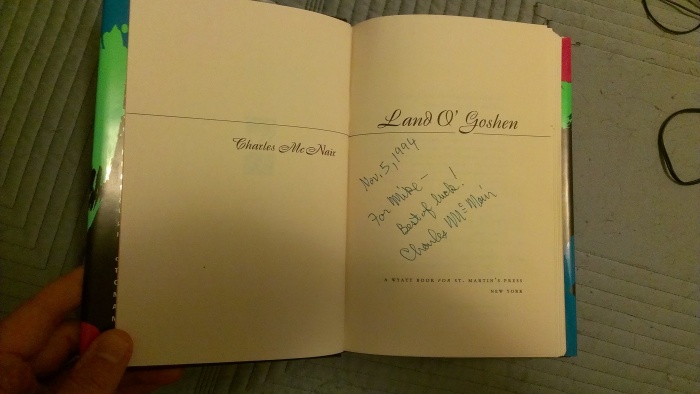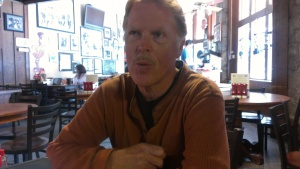Mallet Man
Charles McNair is Mallet Man.
So am I.
He’s a generation older than me, but our lives have intersected in the most interesting ways.
We both lived Mallet Assembly honors dorm at the University of Alabama in Tuscaloosa when we were in college. Mallet Assembly is like Animal House meets the Big Bang Theory, home to lots of smart people with destructive tendencies and no minimal supervision.
We also both grew up on the Gulf Coast. He grew up in Dothan, Ala., and later lived in Mobile, Ala. I grew up in Mobile. We know that the Gulf Coast is its own world, quasi-independent of the states that share its shores.
Charles also, by coincidence, gave a copy of his last book, “Land O’ Goshen” to my father in law at a book signing.

Copy of the book Charles McNair signed for my father in law back in 1994. I was stunned when I figured this out.
My father in law gave it to my future wife before I met her. She packed that book and took it with us from Tuscaloosa, to Birmingham, to Anniston, to Chattanooga, Tenn., to Atlanta and – finally – to Decatur, Ga.
In a strange sort of way, Charles McNair has been with me since college. As far as my memory is concerned, I only met him a few weeks ago. I was at the Twain’s trivia night for the re:loom benefit. Lisa Wise, Executive Director with the Atlanta Initiative for Affordable Housing, introduced us through a mutual friend.
“Land O’ Goshen” was nominated for a Pulitzer Prize. His forthcoming book “Pickett’s Charge,” sounds like it’ll make some noise too. It’s his first outing in 19 years.
When I figured out that the man I met at Twain’s was actually somebody important, I did the only thing I could do as an aspiring writer.
I began sucking up to him.
I shot him an email that began, “So you’re famous, apparently.”
“Dear Dan,” was his reply. “Ha.”
That was how I was reintroduced to Charles McNair and reminded that a lot of interesting men walked out of Mallet.
A week later, we were at Manuel’s Tavern. Charles sat across from me, sporting a thin mustache and speaking in a voice soft as tissue paper. I had forgotten to bring my wife’s copy of “Land O’ Goshen.” But I’ll get another chance. He’s throwing a launch party for his new book, “Pickett’s Charge,” at Manuel’s on Sept. 25, 7 p.m.
“Everyone’s invited to that,” Charles asked me to tell everyone.
Noted. Done.
I never read “Land O’ Goshen” but I’m thinking I probably should since I just interviewed the author. Of course, I backed into this interview opportunity anyway, so I guess I can’t be faulted for not preparing. Also, if you didn’t know this, I’ve been busy as all kinds of hell.
Charles told me that “Land O’ Goshen”, which is out of print at the moment, is being developed into a concept for a movie.
“Oddly, the day I hit the send button to send the final version of (“Pickett’s Charge”) off to my publisher, that same afternoon the phone rang,” Charles said. “An indie film maker in northern California had, unbeknownst to me, written a 105-page treatment of ‘Land O’ Goshen’ for the movies. He is earnestly going about trying to turn this into an indie film. It was astonishing that after 19 years … somebody liked this book enough to champion it.”
He closed the book on that topic, saying there would be more news on it – hopefully.
Charles had a pretty great pitch for his new book, “Pickett’s Charge.”
A good pitch should be short and pique your interest.
Here was Charles’:
“Threadgill Pickett is the last living Confederate soldier and he learns there is just one Yankee still alive up north,” Charles said. “He heads up north to fight the last battle of the Civil War.”
Go on.
“He’s 114 years old and has nursed a great vengeance for years. That kept him alive,” Charles said. “When his moment comes to even up the score, he heads north, goes through the 1960s and runs into the Civil Rights movement, into the hippies, the Space Race all of the consternation that comprises the collective nervous breakdown called the 1960s.”
I see where you’re going with this …
“He’s sort of a metaphor for the South, stricken and wounded and nursing its grudges,” Charles said.
Bingo.
You have to be from Alabama to appreciate the complexity of loving a place you know has been so fundamentally wrong on so many levels. You feel pity and regret, but also hopeful that people can change. That hope comes and goes, depending on how badly Alabama is embarrassing itself at the moment.
But it’s always there.
I asked Charles some self-serving questions posing as journalistic ones.
How does he write novels? Does he sit down and plan everything out? Or does he wing it?
“I’m a very make-it-up-as-you-go, in-the-moment writer,” Charles said, adding that if he weren’t, “Maybe I could do a book faster than every 19 years.”
We got on the topic of Mallet. We both agreed that it was a pretty pivotal experience in our lives. I met my best friend there and through my best friend, I also met my wife. While living at Mallet, I decided that writing was my “thing.”
I could hear the pride in Charles’ voice when he talked about living in Mallet.
“I will say that, apart from puberty that and becoming a father, there has been no other more important event in the shaping of who I am than the years I spent in the men’s honors dorm at Alabama,” Charles said. “I came off a dirt street with 100 acres of woods behind the house into an environment of very smart guys who stimulated my dream of who I could be in a way that had never occurred to me.”
The things that never occur to you are the things that always seemed to occur at Mallet.
I remember when I arrived I received a handbook from the senior residents with a list of rules.
One of them was, “Don’t start arbitrary fires.” I also remember one of our floor leaders burned up his hands on a rope trying to rappel from the third story window.
Then there was the annual Spring Orgy, which was basically an excuse for everyone to get shitfaced and run around naked. It ended with the dorm leaders smearing the floor with lubricant and inviting us all to slide down it.
I passed on that particular ritual.
The shenanigans of yore sounded interesting, too.
“The very first day I was there, there were guys putting an antenna on the roof, strictly against university policy. It was designed to pick up a little cable station in Atlanta, Georgia that had just been started by Ted Turner,” Charles said. “We sat around with all of these pieces of antenna. It wasn’t even in my mind to dream that people could do that. I knew those things happened, but there they were, making it happen themselves.”
Several years after I left Mallet, the University banished the dorm to the ass end of campus and implemented stricter supervision of its members. Some of what’s happened to Mallet has been self inflicted. There was a gradual lack of scrutiny of applicants and generally irresponsible behavior by those in charge.
But the University had been itching to crack down Mallet for years. We were no friends of authority, and I think that attitude made me a better reporter than I otherwise would’ve been.
The recent despicable behavior by our university officials makes Mallet look like the Mickey Mouse club by comparison.
Charles set aside 30 minutes for the interview, but then he had to go.
Writing a book sounds like the easy part. Promoting it must be a real pain in the ass. Charles has been hitting the promotions hard. He’s been featured in several local publications. He’s kind of a big deal.
Mallet, represent.
Later that day, Charles sent an email thanking me for the interview.
I told him that he was probably helping me more than I was helping him.
I told him that I’d let everyone know about the Sept. 25 event at Manuel’s, too.
“Thank you,” Charles wrote. “And please let those Malleteers know that a brother has a book.”
Noted. Done.

